|
De Amerikaanse dichter, schrijver en vertaler Norbert Krapf werd geboren op 14 november 1943 in Jasper, Indiana. Zie ook alle tags voor Norbert Krapf op dit blog.
The Campfire Poets
Coming down a back road,
I saw a campfire in the woods.
Tired, I wandered over,
slipped off my backpack,
looked down at a man and woman
whose eyes burned like coal.
He was fleshy, had a bushy gray beard;
she was petite, bursting with dark energy.
He said he was the poet of the body and soul
and all people; she said she wrote letters
to a world that never wrote back.
They moved a bit apart, he motioned
me to sit down between them,
and I knew I'd found eternity
off the side of a back road
in the hill country woods.
Emily Dickinson's Song
Sing me a song, Emily,
I said, and she laid one
on me like I never heard.
At once I tumbled head
over heels into the dark
that was somewhere inside
and hit millions of worlds
I never knew existed
and my eyes went out
and then somewhere else
I woke up and saw
that I had come into
a searing light that
turned everything in view
into x-ray versions
of the objects that were
like shadows in a cave
where Plato lived.
Then I looked up
and Emily sat smiling
in her white dress.
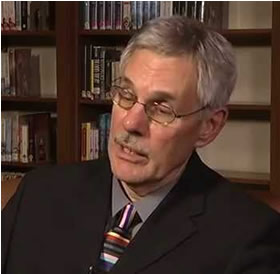
Norbert Krapf (Jasper, 14 november 1943)
De Nederlandse schrijver en columnist Jonathan van het Reve werd geboren op 14 november 1983 in Amsterdam. Zie ook alle tags voor Jonathan van het Reve op dit blog.
Uit: De boot en het meisje
“Ik word gered door geschreeuw van Rosa uit de keuken. 'Ping, ping, hallo! Jongens, kan dit mee? Warme borden! Ping! Tafel één! Ik maak alles maar één keer! Ping! Kan iemand lopen?' Ik spring op, maar Rosa en Bart komen mij al tegemoet met de borden. 'Ach, het gaat ook wel zo,' zegt Rosa. Ze steekt heel kort haar tong naar mij uit. We gaan zitten. Bart wil geen wijn: het bier smaakt goed. Ik ben de hele tijd een beetje bang dat hij iets kapotmaakt, of dat hij een vieze boer laat, maar voorlopig valt het allemaal mee en eet hij zelfs met mes en vork. De coquilles zijn zo lekker dat er pas weer over iets anders kan worden gepraat nadat iedereen dat twee of drie keer heeft gezegd. Ik besluit beleefd en gezellig te zijn.
`En Bart,' vraag ik. 'Wat doe jij? Ook iets artistieks?' `Nee, antropologie. Laatste jaar.' Wat voor onderwerp?' Ja, heel breed eigenlijk. Ik doe nu een onderzoek in de Bijlmer, naar kleine minderheden met een eigen kerk en een eigen cultuur. Ik ga in november waarschijnlijk naar Afrika.' 'Om te kijken waar die mensen vandaan komen?' `Ja,' zegt Bart. 'En hoe hun familie daar leeft, en wat de verschillen zijn met hier. En misschien ga ik dan ook nog een paar maanden vrijwilligerswerk doen of zo.' 'En betaalt de universiteit dat allemaal?' Rosa drukt onder tafel met haar hak op mijn tenen. Ik vertrek geen spier. 'Ja,' zegt hij. 'In ieder geval de eerste maand. Voor daarna probeer ik nog een soort beurs te krijgen.' `Spannend,' zegt Rosa. 'Maar waar hadden jullie het nou over, daarnet? Met die Romeinen?' `Rachel studeert af aan de Rietveld,' zeg ik, en onderdruk een grijns. Rachel bloost weer. '0 ja, waarvoor jullie ook in New York waren,' zegt Rosa. 'Is dat nog gelukt?' `Ja hoor,' zegt Bart. 'Toch?' 'Ja,' zegt Rachel. 'Ik moet nog heel veel monteren.' `Maar wat was die zin nou, met die Romeinen?' Nu schop ik Rosa tegen haar enkel. `Romans through the time. A stone's search for entertainment now and then,' zegt Bart. `Zo heet het.' 'A rock's quest,' verbetert Rachel. Rosa staat op. Ik veer op uit mijn stoel en begin de borden te verzamelen. `Laat maar,' zegt Rosa. 'Geef maar.' Ze neemt de borden uit mijn handen en loopt naar de keuken. Ik ga weer zitten. `Zal ik je weer even helpen?' vraagt Bart. `Nee,' roept Rosa. 'Het is al klaar. Maken jullie maar ruimte voor een grote pan. Ik kom eraan.' `Zij kan echt. Zo lekker koken,' zegt Bart. 'Kun jij dat ook?"
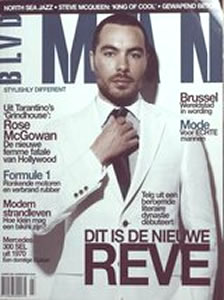
Jonathan van het Reve (Amsterdam, 14 november 1983)
Cover
De Duitse schrijfster Olga Grjasnowa werd geboren op 14 november 1984 in Baku, Azerbeidzjan. Zie ook alle tags voor Olga Grjasnowa op dit blog.
Uit: Gott ist nicht schüchtern
„Durch das Bullauge des Flugzeugs sind bereits die ersten Felder zu sehen, ihnen folgt ein Häusermeer und verschwindet wieder, dann schwenkt die Tragfläche nach oben, und durch das Fenster ist nur noch das Himmelblau zu sehen. Der Flügel senkt sich wieder, und Hammoudi sieht ein von der Sonne verbranntes Feld. Die Räder setzen unsanft auf.
Der internationale Flughafen von Damaskus hat sich seit Hammoudis letztem Besuch kaum verändert. Hinter den Kabinen, von denen die Farbe abblättert, stehen dieselben schlechtgelaunten Grenzbeamten wie immer. Mürrisch mustern sie seinen Pass und machen ihn darauf aufmerksam, dass er in ein paar Tagen abläuft. »Deswegen bin ich ja hier«, sagt Hammoudi. Der Grenzbeamte in seiner schlechtsitzenden Uniform scheucht ihn fort.
Hammoudi ist gerne in Syrien, doch stets unter Vorbehalt: Sein ganzes Leben lang wurde ihm eingetrichtert, dass es hier keine Zukunft gebe und er spätestens nach dem Studium nach Kanada, Australien oder Europa auswandern sollte. Das Leben, das er in Syrien gelebt hatte, hat diese Vorbehalte bestätigt.
Das Gepäck lässt lange auf sich warten. Mehrere Großfamilien werden ungeduldig; Kinder quengeln; ein Herr mit graumeliertem Haar zündet sich eine Zigarette an und wird vom Wachpersonal ermahnt; Putzfrauen laufen betont langsam mit ihren Wassereimern hin und her, ohne etwas zu putzen.
Als das Licht über dem Gepäckband endlich rot aufblinkt, scharen sich alle um den Ausgabepunkt und versuchen, sich einen strategisch günstigen Platz zu sichern, wobei zwei blonde Männer mit rötlichem Bart, die laut Schweizerdeutsch miteinander sprechen, am Ende siegen. Als das Karussell sich endlich in Bewegung setzt, geht ein Raunen durch die Menge. Das Gepäck wird schnell vom Band genommen. Taschen, Koffer aus unterschiedlichsten Materialien, Bündel, Rucksäcke und Kartons werden geschultert, auf die Gepäckwagen gelegt und euphorisch in Richtung des Ausganges geschoben.
Hinter der Absperrung in der Ankunftshalle steht eine Masse von Menschen, die nach ihren Verwandten und Freunden Ausschau halten und auf diese zustürmen, sobald die Tür zur Gepäckausgabe sich einen Spalt breit öffnet. Ein Polizist ermahnt sie immer wieder, nicht zu nahe an die Tür zu kommen. Auf den Gesichtern wechseln sich in kurzen Abständen Freude, Neugierde und Bestürzung ab. Kinder mit Luftballons in den Händen stehen ratlos herum, Babys, deren Väter mit Blumensträußen winken, reiben sich vor Müdigkeit die Augen.“
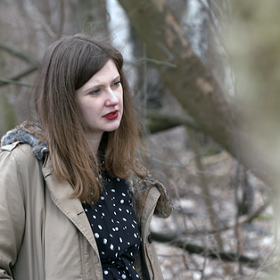
Olga Grjasnowa (Bakoe, 14 november 1984)
De Zweedse schrijfster Astrid Lindgren werd als Astrid Ericsson geboren op 14 november 1907 en groeide op op de boerderij Näs in Vimmerby in Småland. Zie ook alle tags voor Astrid Lindgren op dit blog.
Uit: Pippi Langkous (Vertaald door Liesbeth Zuiderveen Borgesius-Wildschut en Saskia Ferwerd)
“Op die mooie zomeravond, toen Pippi voor de eerste keer over de drempel van Villa Kakelbont stapte, waren Tommy en Annika toevallig niet thuis. Ze logeerden een weekje bij hun oma. En toen ze de eerste dag nadat ze weer thuis waren gekomen over het tuinhekje stonden te kijken, wisten ze nog niet dat er zo dichtbij een kind was komen wonen. Ze stonden net te overleggen wat ze zouden gaan doen en vroegen zich af of er die dag nog iets leuks zou gebeuren, toen het tuinhekje van Villa Kakelbont openging en er een meisje uit stapte. Het was het vreemdste meisje dat Tommy en Annika ooit hadden gezien. Dat was Pippi Langkous, die een ochtendwandeling ging maken. Zo zag ze eruit: haar haar had dezelfde kleur als een wortel en het zat in twee stijve vlechtjes, die van haar hoofd af stonden. Haar neus leek op een aardappeltje en was helemaal gespikkeld door de zomersproeten. Onder die neus zat een nogal grote mond met spierwitte tanden. Haar jurk was nogal apart. Pippi had hem zelf gemaakt. Eigenlijk had hij helemaal blauw moeten worden, maar er was niet genoeg blauwe stof. En dus had Pippi er roze lapjes in genaaid. Om haar spillebenen zaten lange kousen, de ene kous was bruin en de andere zwart. En dan had ze nog een paar zwarte schoenen aan, die precies twee keer zo lang waren als haar voeten. Die schoenen had haar vader op de groei voor haar gekocht in Zuid-Amerika. En Pippi wou nooit meer andere hebben.
Maar wat Tommy en Annika het allermeeste verbaasde, was de aap die op de schouder van het vreemde meisje zat. Het was een klein aapje met een blauw broekje en een geel jasje aan en een witte strohoed op.
Pippi begon te wandelen met één been op de stoep en het andere been in de goot. Tommy en Annika keken haar na, zo ver ze konden. Na een poosje kwam Pippi terug, en nu liep ze achterstevoren. Zo hoefde ze zich niet om te draaien als ze weer naar huis ging. Vlak voor Tommy en Annika’s hek bleef ze staan. De kinderen keken elkaar aan. Ten slotte zei Tommy: ‘Waarom loop je achterstevoren?’
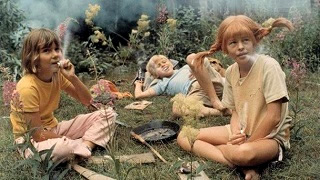
Astrid Lindgren (14 november 1907 - 28 januari 2002)
Scene uit de gelijknamige film uit 1969
Vlaamse schrijver, dichter, politiek activist en componist René Desiderius de Clercq werd geboren in Deerlijk op 14 november 1877. Zie ook mijn blog van 3 november 2010 en eveneens alle tags voor René de Clercq op dit blog.
De witte sneeuw
De witte sneeuw, waarmee de vlakten pronken,
Boelt met de zonne tot haar schade en schand.
Ze ligt en lacht en tintelt, wonnedronken,
Totdat ze smelt en slijk maakt op het land.
De witte sneeuw, waarvan de bergen vonken,
Wanneer de hemel stooft en staat in brand,
Die zonnelach weerkaatst, en zonnelonken,
Blijft eeuwig hoog en eeuwig diamant.
Al eveneens, vergaat of staat de Minne:
Die niets beoogt dan 't laag genot der zinnen,
Ziet zijn geluk verslijkt eer hij 't vermoedt;
Veel hoger wil ik mijne liefde plaatsen,
Waar ze ongedeerd het zonlicht kan weerkaatsen,
En rein blijft in des hemels hoogste gloed.
Het vlas staat in de blom
Het vlas staat in de blom,
Al groen en blauwig;
En 't windje vliegt er om
Zo vleiend lauwig.
De herels rechten flinks
Hun tere topkens,
En keren, rechts en links,
Hun kleene kopkens.
Hoe zot en preuts ze zijn,
Elk met zijn vaantje
Van hemelblauw satijn
Op 't groene staantje!
Hier beet een bruine bie;
En ginder, ginder,
Vlug weg en weder, zie!
Een witte vlinder!
En voort, tot waar dat blauw
En groen in 't koren,
Vol lokkend grijs en grauw,
Verloopt, verloren;
Zo ver als om-en-dom
Het oog kan dragen,
Het vlas staat in de blom
Te wiegewagen.
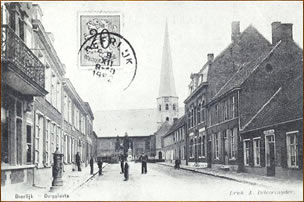
René de Clercq (14 november 1877 - 12 juni 1932)
Deerlijk. De Dorpsstraat op een oude ansichtkaart.
De Engels-Mexicaanse schrijfster Chloe Aridjis werd geboren in New York op 6 november 1971 (en dus niet op 14 november zoals eerder vermeld). Zie ook alle tags voor Chloe Aridjis op dit blog.
Uit: Assunder
“Until then, it is true, I envied my colleagues at the new Tate, and when this sun first rose I would, on days off, walk along the river to the museum and spend long whiles on my back staring upwards. A mirror had been fastened to the ceiling and there’d be dozens of us lying in random configurations on the concrete floor, waving at our reflections above, and I felt like I was at a site of pagan worship, all eyes converging on this great yellow sphere whose emanations remained a mystery – that is, until the guards began complaining of headaches and dizziness and cursing the fumes released from the artificial astral body, especially Martin Strake who, already prone to migraines and sensitivity to light, made a point from the start of looking the other way. After a few weeks the monofrequency lamps really took their toll; Martin succumbed to their haze, his legs grew weaker, his eyesight began to blur, his movements trance-like as if dictated by this overhead sun, attached to it by invisible strings.
And I succumbed, I too, and for several weeks went to worship the ephemeral god, until I found out this supposed orb wasn’t even a whole but a semicircle. We had been going to pay our respects to a semicircle, made whole by its reflection in a mirror. To this day I wish I hadn’t looked at the catalogue and had continued with my fantasy of the whole, but in the end, all that matters is that the Scandinavian’s piece was eventually replaced by something else of monstrous proportions yet not as precarious and that Martin Strake gradually regained his former self and could turn his eyes towards the Turbine Hall without dissolving. I used to envy those who were assigned temporary rather than permanent exhibits before realising that temporary is too risky; you never know what you are going to get.
Life at our Gallery is more predictable.
Early each week we are assigned different sections of a wing and, within these sections, four rooms a day. In the morning we shed our civvy clothes and slip on our uniform: a mouse-grey jacket with matching trousers or skirt, a pale lilac shirt and a shiny purple tie. We are given twenty-four minutes a day to change, an iron always available in the changing room, and in my nine years working here those twelve minutes in the morning and twelve in the evening, during which all kinds of little transformations take place, have gone by in a flash.”
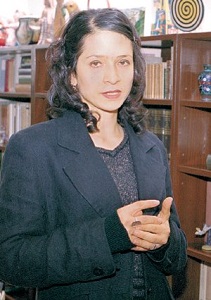
Chloe Aridjis (New York, 6 november 1971)
De Amerikaanse journalist en schrijver P.J. O'Rourke werd geboren op 14 november 1947 in Toledo, Ohio. Zie ook alle tags voor P.J. O'Rourke op dit blog.
Uit: How the Hell Did This Happen?
“People who work in the news media do not watch The Apprentice because of what’s been happening in the news media for a number of years, causing all of us who work in it to never want to hear the words “You’re fired” again. This was a mistake. Donald Trump, the actor who plays “Donald Trump,” appeared on The Apprentice for eleven years. At its peak, the show had 20 million viewers. And Trump is a good actor. Donald Trump is almost as good as Alec Baldwin at being Donald Trump.”
(...)
“And yet the debate was highly informative—if you turned the sound off. The event was broadcast with a split screen so that each presidential candidate was visible while the other candidate was talking. The talk was insipid, but the expressions on the candidates’ faces were fascinating. Trump was serious of mien. He concentrated intently on what Hillary was saying. Sometimes there was a little twitch of annoyance; sometimes, a small frown of disagreement. But mostly he looked deeply thoughtful. (Where he got that look is anyone’s guess. Maybe he purchased it at the same strange haberdashery where Hillary buys her Hillary costume.) Clinton is supposed to be the one with the deep thoughts. But there she was thoughtlessly making rude grimaces whenever Trump was speaking. Mom always said, “You shouldn’t make faces—your face may get stuck that way.” Hillary’s face got stuck that way. She spent the whole evening with a wipe-that-look-off-your-face look on her face.”
(...)
“There isn’t, incidentally, any such thing as an ancient Chinese curse saying, “May you live in interesting times.” The phrase seems to be a piece of invented Orientalist folklore coined in the 1930s by First Lord of the Admiralty Sir Austen Chamberlain, half-brother of Prime Minister Neville Chamberlain who went off to Munich to appease Hitler. And let’s not be silly and forget that the Chamberlain brothers lived in much more accursedly interesting times than our own. What I thought was going on in the 2016 election cycle was a mere fight to the death between two fundamental American political ideologies.”

P.J. O'Rourke (Toledo, Ohio, 14 november 1947)
Cover
De Litouwse schrijfster Jurga Ivanauskaitė werd geboren in Vilnius op 14 november 1961. Zie ook alle tags voor Jurga Ivanauskaitė op dit blog en ook mijn blog van 14 november 2010.
Uit: The Red Dress (Vertaald door Kristina Sakalavičiūtė)
“Nora suddenly jumped up, locked the door and, throwing off the violet sweater and green skirt resolutely, grabbed the red dress and froze for an instant. Then, in a frenzy—as if someone were impatiently yelling at her to hurry—she began to dress, rushing, staggering, having difficulty getting into the sleeves. Getting into the fiery garb was not so simple, even though Nora was smaller than Elegija. The dress clung to her and outlined her body, emphasizing her breasts, pulling tight on her hips and thighs. It fell from her knees in tiny pleats, which spread on the floor like sharp tentacles. Nora looked at herself in the mirror, pulling back her black hair. It used to have a blue sheen, but now it became chestnut-colored because of the intensity of the red dress. She narrowed her eyes and smiled with satisfaction.
The inside of the dress was the opposite of its silky exterior. It was coarse and chafed her in a strange way. Nora thought it felt like a facial masque of egg whites and yeast that tightens on one's face. She began to walk around the room, a trifle dissatisfied that the dress restricted her steps. She imagined Salome floating across the stage—not shuffling like Cho-Cho-San. Fortunately, she had another costume for the dance scene.
Suddenly, somebody knocked at the door. Nora started and rushed to take off the dress. But it was so tight it seemed almost impossible to pull off—the dress kept catching on her shoulders.
"Yes, my shoulders really are broader than Elegija's," Nora uttered, wriggling, squirming and crying out. The dress did not yield.
Someone was now persistently knocking at the door.
"Hey, Nor, open the door," rang Vilija's deep voice. "Stop fooling around."
"Quick, Nora, or I'm going to bust. I can't hold it any more. Some Georgians lugged this huge box here for Elegija," Laimis shouted, kicking the door.”
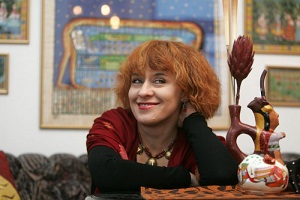
Jurga Ivanauskaitė (14 november 1961 - 17 februari 2007)
Onafhankelijk van geboortedata:
De Amerikaanse schrijver Peter Orner werd in 1968 in Chicago geboren. Zie ook alle tags voor Peter Orner op dit blog.
Uit: Esther Stories
“The girl was young when she did it, and she didn't live there. This was in 1962. She was eighteen. She'd been hired to tidy the place. It was three, maybe four years before anybody noticed. The letters were so small, and they always ate in the kitchen. And when they did discover them, she was already gone to Halifax. By that time the girl had a reputation to escape from. So when they put two and two together and figured out it was she that did it, they weren't surprised. Of course she'd be the one to do something like this, they said—shameless girl, not shocking at all.
A cod fisherman, a captain, lived in the house with his wife, one of the original Locke mansions on Gurden Street overlooking the harbor. They never had children, but dust collects nonetheless in a house so huge. The girl had never been in a place that grand. At least that's what they told each other when they found her letters. RGL. That she'd wanted to leave her mark in the world, something that would last, something that would stay. The family still lived in town, her father and brothers sold hardware, so they could have held somebody accountable for the damage if they'd wanted to. But the captain and his wife talked it over and decided not to mention it to anyone. Not that they approved—Lord no. It was defacement of property. Vandalism. Of course it was an heirloom; it had belonged to her mother's mother, a burnished mahogany drop-leaf built in York in 1844. They could never approve. But they were quiet people; they kept to themselves in the hard times, and even in the good times they held their distance. Besides, what could anybody do about it now? What was done was done. Still, that didn't mean the captain's wife didn't watch more carefully over the other girls who came to clean, and it didn't mean the captain didn't sometimes think of her sugar breath, that morning, the one out of a thousand when he was home and slept late—he'd startled her in the kitchen. Captain Adelbert! I didn't have any idea you were home, me banging the pots down here to wake the dead. His only intention was to touch her sweater (Lucy was out, still teaching school then), but he couldn't stop and kissed her, her hands at her sides. She didn't resist or desire, and that had made him a fool for years.”
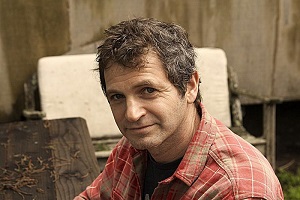
Peter Orner (Chicago, 1968)
Zie voor nog meer schrijvers van de 14e november ook mijn blog van 14 november 2015 deel 2.
Zie voor bovenstaande schrijvers ook mijn blog van 14 november 2008, mijn blog van 14 november 2007 en ook mijn blog van 14 november 2006.
14-11-2017 om 00:00
geschreven door Romenu 
Tags:Norbert Krapf, Jonathan van het Reve, Olga Grjasnowa, Astrid Lindgren, René de Clercq, Chloe Aridjis, P.J. O'Rourke, Jurga Ivanauskaitė,, Peter Orner, Romenu
|

